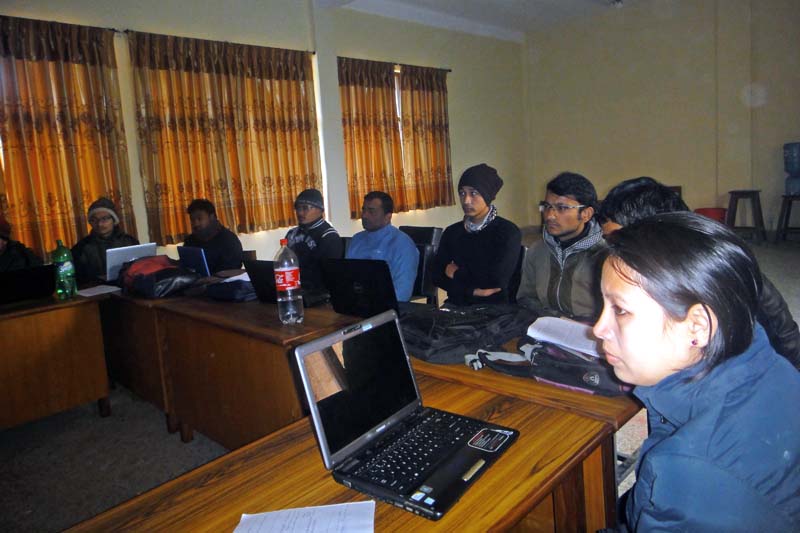Addressing energy needs
Kathmandu
Nepali citizens’ daily life has become chaotic due to lack of fuel and winter has added to their woes. Those living in earthquake-affected areas are suffering even more. Nepal is facing all these difficulties because it is not independent regarding energy. In such a context, a new course introduced by Tribhuvan University, Institute of Engineering (IOE) may give better hopes for future. The newly introduced MSc Programme and Research Project Energy for Sustainable Social Development (MSESSD) — jointly launched by Norwegian Institute of Science and Technology (NTNU), Norway; and IOE, Pulchowk — can help address the energy needs of Nepal for its sustainable social development. The programme also has provision of PhD level that is yet to start. But it has been three weeks that MSESSD classes are running in the campus.
Sandwich programme
MSESSD is a “sandwich programme” where students get to learn from Nepali and Norwegian professors. Dr Sushil B Bajracharya, Associate Professor/Programme Coordinator of MSESSD explained, “MSESSD is a sandwich programme — because the course has been developed by professors of Nepal and Norway. The students are focused on courses related to architectural engineering and mechanical engineering. Architectural part emphasises on rural and urban planning as well as energy planning. Meanwhile, mechanical part focuses on generation of renewable energy.”
Only those students who have completed their Bachelor’s in Architectural Engineering, Civil Engineering, Mechanical Engineering, and Agriculture Engineering are eligible for this course. The students also need to pass the entrance exam taken by IOE and will get admission on merit basis.
The new programme focuses on the planning and designing energy as per the locality and looks forward to make that area energy independent.
Adding more about the programme, Dr Bajracharya elaborated, “MSESSD is a research and field based programme in semester system with four semesters. The students have to do research and field works. For that we have collaborated with two government agencies — Alternative Energy Promotion Centre (AEPC) and Association of District Development Committees (ADDCN). The students get to involve directly with locals and deal with the energy related problems along with finding solutions to them. They learn to implement projects in community basis.”
Need for MSESSD
Nothing is possible without energy. According to Dr Bajracharya, energy can be categorised in two types — commercial energy and renewable energy, where Nepal is facing difficulties due to its dependency on commercial energy like petroleum products.
He expressed, “The production of commercial energy is decreasing and world is also concerned about this fact and is looking for its alternative. And renewable energy is the best solution that is necessary for society’s sustainable development.”
Meanwhile, Pratiksha Shrestha, MSESSD Ist Semester student stated, “I have completed my Bachelor’s level from Architectural Engineering and after 10 years I have joined this Master’s level course as there is limited choice for doing Master’s in our country. I chose this subject as it is a new course with multi- disciplinary approach towards sustainability, social studies and engineering. With the knowledge gained, I will be more confident to explain and aware people about sustainable housing, which definitely will help me enhance my career.”
Another student Mimang Hang Kirat was curious about the course and “while in field work for an NGO, I realised the need of sustainable development”. That is why he joined MSESSD. With the MSESSD degree, he feels, “I will be able to work in the field even better.”
According to Dr Bajracharya, students can opt for higher level studies abroad after the completion of their Master’s level. They can also work as entrepreneurs, researchers, government officers and more.
Scholarship
MSESSD, financed by NORAD’s Energy and Petroleum Programme with budget $1.1 million, has been implemented for November 2015 to October 2019 duration. The students pursuing this course will get their tuition fee back as scholarship if they pass in all the semesters as per Dr Bajracharya.
Time management for the students seem to be the challenge in current scenario as most of the students are already professionals and as the class is set from 12:00 pm to 5:00 pm. Those who are already working are having difficulties to manage time for their classes.
Nonetheless, the students are optimistic like Shrestha, who shared, “Managing time is a challenge for me but I am determined to complete my Master’s level.”






